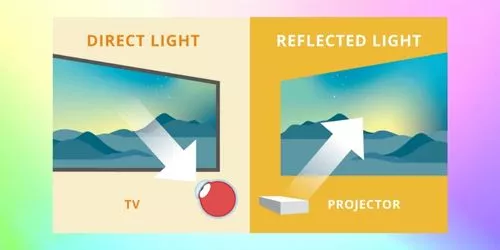As far as your comfort dictates, that is the distance you should sit from the projector. In most cases, the optimum viewing distance is about 1 meter. This is because it is the distance at which you have the least eye strain. Also, this is the optimal viewing distance for a 3D movie experience. However, there are also a few considerations to keep in mind. Is Projector Light Harmful To Your Eyes? The first thing to consider is whether you will be sitting on a couch or chair and what kind of seat that is. A sofa or couch is usually considered a good seating option, but you may want to sit closer for some movies. This depends on the size of the screen. For instance, a 35-inch screen may not require as close a proximity as a 42-inch screen.
Another thing to keep in mind is the size of the room you are in. You might want to move away from the screen if you have a large room. If you have a small room, you may want to sit closer. Also, if you are in a darkened room, you may be more comfortable with your eyes farther away from the screen. If you plan to use a tripod or a stand for your device, you can determine your ideal distance to the screen based on these considerations.
Is Projector Light Harmful To Your Eyes?
The short answer is yes; projector light can harm your eyes.
Projector light is also known as “projection light.” This is the bright white light that’s emitted by most home projectors. When projectors are used indoors, they create an enormous amount of light that is harmful to your eyes.
When you’re using a projector indoors, the light can cause glare and strain your eyes. This is particularly true if the projector is close to your face and the screen is either very large or positioned far away. In such a case, the brightness of the light can make your eyes feel sore and tired.
What are the effects of projection light on your eyes?
Well, it can be damaging for a couple of reasons. For starters, the light can cause temporary vision loss. If you’re looking at a small area of the screen for long periods, you can lose focus and temporarily see black spots.
Additionally, the light can damage your eyes over time. When you spend a lot of time looking at the screen, your pupils dilate and constrict. Over time, this can lead to permanent damage, which can make it harder to see.
How can you protect your eyes from project light?
You can use an eye mask, which is something you may already be familiar with. These lightweight masks block out the light and are made of material that’s comfortable to wear.
Alternatively, you can use an external projector, which uses a different light source than what projectors use inside your home. These projectors use a blue or green LED bulb to create a softer, safer light.
You can also change your viewing habits. Instead of looking at the screen directly, you can choose to use a wall-mounted TV or a computer monitor. Projecting images on a wall or on a computer monitor will soften the light, making it easier on your eyes.
Finally, make sure to turn off your projector as soon as you’re finished. A light that’s on for hours at a time can be extremely damaging to your eyes.
In short, project light can be harmful to your eyes. Be careful when using a projector, and make sure to follow proper safety guidelines.
Is a projector better for the eyes than a screen?
The projector is better for the eyes than the screen. The screen is not healthy to use because it causes eye strain, and eye strain is not good for you.
Most people don’t know how damaging a computer monitor can be for their eyes. In fact, according to the American Optometric Association, “The human eye is extremely susceptible to damage from prolonged viewing of computer monitors.”
Many experts advise against staring at a computer monitor all day. That’s not to say that you should avoid using your computer. However, you should get an excellent, big, wide-screen television or a projector. The benefits are obvious.
You’ll get more from your computer, and you won’t suffer from eye strain or headaches. You’ll also be able to see your screen from any angle, so you won’t have to strain your neck to read the text on your screen. This could be a game-changer.
Also, if you’re using your computer for work, a projector or large television can be an easy way to create a professional-looking presentation. If you’re trying to give a presentation or hold a meeting, you can use your computer as a screen. That way, everyone can see what’s going on, and you don’t have to worry about someone else’s computer messing up your carefully planned slides.
You should be fine if you’re not spending a lot of time staring at your computer screen. Just make sure to take breaks. The more you sit, the worse your eyes will feel. So try to take some time for yourself every day. Go outside, get some fresh air, or spend quality time with your family.
If you’re constantly struggling to see your screen clearly, it may be time to get a new monitor. You can damage your eyes by staring at a computer screen for long periods of time, and you don’t want that happening. So make sure you’re taking the right steps to make sure you’re using your computer to protect your eyes.
Can laser projectors damage your eyes?
Laser projectors are safe. They use a beam of light instead of heat to project images onto surfaces, which means they can’t harm the eyes. However, it’s still a good idea to wear sunglasses when you’re using the projector. The light can be strong enough to damage your eyes if you’re not careful.
The most common type of laser projectors is DLP (digital light processing) projectors. These are relatively inexpensive, and most come with the option to adjust the projector’s brightness to fit the room automatically. A few projectors also include the option of a night mode that dims the display down.
Another type of projector is the LCD projector. This type of projector uses liquid crystal technology to create an image on a screen. These projectors are generally more expensive than DLP projectors, but they have a higher resolution, making them better for projecting video than for displaying text.
Some projectors have built-in screens, while others come with external screens. This can make a difference when it comes to size. For example, larger projectors often have screens that can be adjusted to fit smaller spaces, and this will make it easier to project images onto walls or other surfaces. If you want to use the projector in a large space, a smaller projector with an external screen is going to be more useful.
Projectors are safe to use, but you should always be careful. When you’re working, try to project the image onto a wall or ceiling, and don’t project the image onto a surface that’s directly in front of you. And if you’re using a laser projector, don’t project it onto the floor or ground. This is dangerous because the light can easily reflect off of these surfaces and damage your eyes.
Remember that even though the laser beam is very bright, the images you’re projecting are still tiny, so make sure you wear appropriate eyewear. And if you experience any discomfort, stop immediately and take a break. You could end up damaging your eyesight if you’re not careful!
Here are a few tips on how to minimize the risk of developing laser eye conditions:
1. Never look directly into a laser beam.
2. Always wear protective glasses or goggles.
3. Keep the laser projector at least two feet away from you.
4. Keep the laser projector pointed away from your eyes.
5. Be careful not to bump the projector accidentally.
6. Check your projector frequently for cracks and scratches.
7. Make sure to clean the laser projector regularly.
8. Use the lowest power setting possible.
9. Avoid watching movies or playing games while using the laser projector.
10. Close your eyes whenever you have to look at the screen.
Is a projector bad for babies?
Projectors are a fantastic tool for parents to use to provide educational entertainment for their babies. However, you should consider a few things before purchasing a projector for your nursery.
First, you need to make sure that the projector you buy is safe for babies. According to the Consumer Product Safety Commission, the main hazard posed by projectors is the risk of electrical shock. If your baby is near an outlet, he or she could be at risk of receiving a shock from the power cord.
In addition, most projectors require a power source. If you don’t have a wall socket nearby, you may need to bring a portable power supply, which may pose another hazard. Your local fire department is also an excellent resource for checking the safety of a power source.
Finally, you need to make sure that the projector is safe for your baby. As a rule of thumb, it is recommended that you avoid using projectors while your baby is still nursing or asleep. Letting your child watch a movie while you’re at work may be tempting, but the light emitted by projectors can pose a serious threat to your baby’s eyes.
Although it is not uncommon to see projectors in nurseries, many other alternatives are safer for babies. If you’re looking for a less expensive option, try creating a slide show on your phone or tablet.
What Happens When You Directly Look Into Projector Lens?
If you look directly into the projector lens, you risk damage to the glass. If you are ever caught looking at the lens during a presentation, you run the risk of being removed from the presentation.
Projector lenses are designed to be opaque. They have been this way since they were invented. When you look into the lens, the image light hits the inside of the lens, and it bounces back out. This reflects the image to the screen, and you see a distorted image. You can easily avoid this problem by looking at the screen instead of the lens.
You should also be aware of the risks of touching the projector. Even the slightest contact with the projector can be dangerous. The glass has a tendency to get hot and burn your fingers. If you accidentally touch the glass while the projector is on, the glass may even start smoking.
The most common cause of projector issues is overheating. When a projector runs too long, the internal parts can get hot, and they become weak and start breaking down. The glass can also break or crack, making the image fuzzy. You can tell if the projector is running hot if you hear popping sounds or see smoke coming out of the back of the projector.
In order to prevent overheating problems, make sure that the projector is always turned off when not in use. The cooling fans should be in good working order, and the lights should be dimmed or turned off. Be sure to clean the dust and dirt off the projector’s internal components often.
Over time, the protective cover of the projector will wear away, and the internal components will be exposed. This is another good reason to make sure the projector is always off. Eventually, you’ll need to replace the internal parts.
So, there you have it. The most important thing you can do to avoid damaging a projector turns the projector off when it’s not in use.
Conclusion
Is Projector Light Harmful to Your Eyes?
We’ll discuss a few reasons why you shouldn’t use a projector to watch movies.
The first reason is the brightness of the light. When you look at a projector screen, you’re looking at around 1,000 lux, and this is much brighter than the light we normally see in our homes.
This is because the projector uses a high-powered bulb to create the image on the screen. So, if you use a projector as a movie source, you may experience headaches, eye strain, and dry eyes.
Additionally, the heat emitted by the bulbs can cause your skin to feel hot.
The final reason is the resolution of the projector. The higher the resolution, the sharper the picture.
Most projectors have a resolution of around 720p, which means the picture quality is not as good as watching a DVD or Blu-ray.
So, if you’re planning on watching movies on your projector, you’re better off renting or purchasing a TV instead.
If you have any questions about the health effects of projector light, check out my video and share your thoughts below!
Frequently Asked Questions
Can a projector light blind you?
Yes, a projector can blind you if you look directly at it. However, if you use a screen, you can see it without being blinded.
What happens if you look into a projector light?
If you look into the projector light, it causes damage to your eyes. It makes them swell up, so they can become infected. You need to keep a safe distance from the light to prevent this. Also, you should wear protective glasses to keep your eyes safe.
What are the side effects of a projector?
The common side effects of the projector include itching, burning sensation, redness, blisters, swelling, redness and hives. You may get allergic reactions if you are allergic to any of the medicines. If you have an allergy to any medicines, you should inform the doctor.
Do projectors give off radiation?
Some projectors emit a small amount of radiation, which is similar to what you get from a radio or television. This radiation doesn’t pose any health risk and is completely harmless. However, if you’re worried about radiation exposure, you might consider choosing another type of projector, such as an LCD projector.











